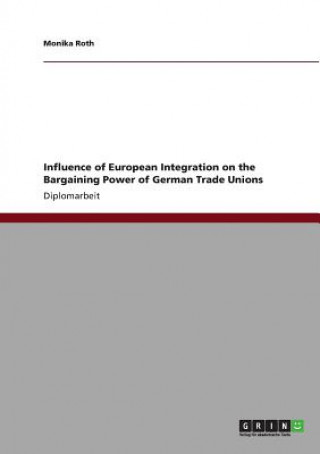
Kód: 05280497
Influence of European Integration on the Bargaining Power of German Trade Unions
Autor Monika Roth
Diplomarbeit aus dem Jahr 2010 im Fachbereich BWL - Wirtschaftspolitik, Note: -, Freie Universität Berlin (Otto Suhr Institut - Politikwissenschaft), Veranstaltung: Politikwissenschaft, Sprache: Deutsch, Abstract: German trade uni ... celý popis
- Jazyk:
 Němčina
Němčina - Vazba: Brožovaná
- Počet stran: 104
Nakladatelství: Grin Publishing, 2011
- Více informací o knize

Mohlo by se vám také líbit
-

One Piece 100
180 Kč -

Vergleichende Anatomie der Hinterextremität palaeognather Vögel
3034 Kč -

Orchideen für Einsteiger
323 Kč -

Once There Were Wolves
734 Kč -

Borderline Personality Disorder and EMDR Therapy
1253 Kč -

Pop-Up Peekaboo! Space
320 Kč -

Seria o komisarzu Williamie Wistingu Tom 12 Ukryty pokój
210 Kč -

KILLING STALKING 1
458 Kč -

Baby Up, Baby Down
170 Kč -

FGTeeV: Game Break!
250 Kč -

One Piece Roman - Novel Law
284 Kč -

Ne m'oublie pas
818 Kč -

Batman: Curse of the White Knight
581 Kč -

Introduction to Algorithms, fourth edition
4237 Kč -

The Rational Male - Religion
497 Kč -

Le Laboureur et les Mangeurs de vent
769 Kč -

Resurrection
430 Kč -

Don Kikhot (Russian)
934 Kč -

Dead Mountain: The Untold True Story of the Dyatlov Pass Incident
303 Kč -

Think Python, 2e
971 Kč -

Ghost Train to the Eastern Star
302 Kč -

Gaia's Garden
616 Kč -

Far And Away
644 Kč -

Oligarchs
446 Kč -

Religion, Culture, and International Conflict
4281 Kč -

People/States/Territories
954 Kč -

Philip Guston
1009 Kč -

A Dozen a Day Anthology
703 Kč -

Economics and the Antagonism of Time
3606 Kč -

Faith, Hype and Clarity
918 Kč -

Frederick Douglass
798 Kč -

Honky Tonk Girl
1007 Kč -

Transcranial Doppler Sonography
3289 Kč -

Us
192 Kč -

Jack's Book: An Oral Biography of Jack Kerouac
595 Kč
Dárkový poukaz: Radost zaručena
- Darujte poukaz v libovolné hodnotě a my se postaráme o zbytek.
- Poukaz se vztahuje na celou naši nabídku.
- Elektronický poukaz vytisknete z e-mailu a můžete ihned darovat.
- Platnost poukazu je 12 měsíců od data vystavení.
Více informací o knize Influence of European Integration on the Bargaining Power of German Trade Unions
Nákupem získáte 180 bodů
 Anotace knihy
Anotace knihy
Diplomarbeit aus dem Jahr 2010 im Fachbereich BWL - Wirtschaftspolitik, Note: -, Freie Universität Berlin (Otto Suhr Institut - Politikwissenschaft), Veranstaltung: Politikwissenschaft, Sprache: Deutsch, Abstract: German trade unions' influence in industrial relations at the national level is curbed by the side effects of European integration. Supranationalization implies the transfer of regulatory power from the national to the supranational level. In the various policy areas, integration and supranationalization proceed at different speeds with regard to scope and level. This also applies to the neighboring policy areas of economic and labor policy. However, due to the overlap of these two policy areas, the asymmetrical integration of economic policy vis-a-vis labor policy leads to shifts in the German collective bargaining system, thus circumscribing the scope of German trade unions' action. More specifically, sectoral asymmetry leads to asymmetric political localization of the policy areas: Regulations in the economy are mainly taken at the EU level, whereas labor and social affairs remain national competences. Furthermore, the insertion of a supra-national layer is accompanied by a policy-theoretical change of the highest governmental and judicial authority from a hitherto (social-democratic) market-correcting consensus to a now market-making approach. This shift causes respective shifts at the national level as well. Additionally, the European Court of Justice possesses supreme judicial competence in both economic and social policy and hence is able to negate national particularities that conflict with EU law. Moreover, EU institutions are able to regulate national labor and wage policy, since there is a broad overlap between economic and wage policies. Supranational regulations in economic policy can thereby influence and constrain national wage policy. Finally, because of Economic and Monetary Union, the exchange rate mechanism is no longer applicable as a tool of economic policy, which entails high incentives for regulating labor costs by wage policy alone.
 Parametry knihy
Parametry knihy
1801 Kč
- Plný název: Influence of European Integration on the Bargaining Power of German Trade Unions
- Autor: Monika Roth
- Jazyk:
 Němčina
Němčina - Vazba: Brožovaná
- Počet stran: 104
- EAN: 9783640839025
- ISBN: 3640839021
- ID: 05280497
- Nakladatelství: Grin Publishing
- Hmotnost: 145 g
- Rozměry: 210 × 148 × 6 mm
- Datum vydání: 23. February 2011
Oblíbené z jiného soudku
-

Amigurumis - soft and cosy!
433 Kč -

GND PAW Plüsch 15 cm Everest
366 Kč -

UNO No Mercy
531 Kč -

KLEINE PRINZ
129 Kč -

Trötsch Plüschpuppe Findus Kuscheltier
339 Kč -

Grammatik aktiv - Deutsch als Fremdsprache - 2. aktualisierte Ausgabe - A1-B1
463 Kč -

Harry Potter und der Stein der Weisen (Harry Potter 1)
250 Kč -

Amigurumis - small and sweet!
434 Kč -

Winnetou 1. Teil
1480 Kč -

Mein Kampf(German Language Edition)
652 Kč -

Mit Erfolg zum Goethe-Zertifikat C1
636 Kč -

Disney Rapunzel (Puzzle)
362 Kč -

Jujutsu Kaisen - Band 19
178 Kč -

Grammatik aktiv
497 Kč -

Triominos Classic
433 Kč -

Wir Kinder vom Bahnhof Zoo
262 Kč -

PAW PATROL Ryder Plüsch, 20 cm
299 Kč -

Avocado Smash
271 Kč -

GND PAW Plüsch 23 cm Skye
439 Kč -

GND PAW Plüsch 15cm Tracker
303 Kč -

Mit Erfolg zum Goethe C1. Testbuch + online
636 Kč -

Deutsch intensiv Wortschatz C1
449 Kč -

Schritte plus Neu 1
582 Kč -

Meine Reise durch Europa
320 Kč -

Duden 12+: Kennst du das? Meine bunte Kinderwelt (Würfel)
230 Kč -

Marble Rush - Ultimate Set XL100 E
1754 Kč -

Beste Freunde Arbeitsbuch A1.2 mit Audio-CD
260 Kč -

Momente A2.2: Kursbuch plus interaktive Version
223 Kč -

Momente A2.2. Arbeitsbuch plus interaktive Version
223 Kč -

GDH Deluxe Room Cakeys Küche
728 Kč -

Spektrum Deutsch A2+: Integriertes Kurs- und Arbeitsbuch für Deutsch als Fremdsprache
729 Kč -

Mein Kampf(German Language Edition)
888 Kč -

Im Westen nichts Neues
310 Kč -

Deutsch für clevere Kids - 5 Wörter am Tag
410 Kč -

Super! 2/A2: učebnice a pracovní sešit + CD zdarma
464 Kč -

Auto-Katalog 2024
351 Kč -

Tarot-Kartenset: Magic Soul Tarot
572 Kč -

Tempo, kleine Fische!
212 Kč -

My Rummy
546 Kč -

Projekt C1 neu: Lehrerbuch mit Audios online
1092 Kč -

Deutsch Großes Übungsbuch Wortschatz aktuell A2-C1. Buch
785 Kč -

Geheim-Codes
294 Kč -

Clever 4ever, Challenge Block, 12 Stück
146 Kč -

Insel der blauen Delphine
198 Kč -

Der Vorleser
310 Kč -

Alpe Adria Radweg
449 Kč -

Hitster - Summer Party
589 Kč -

Prüfungstraining DaF - C1
622 Kč -

Wizard
215 Kč
Osobní odběr Praha, Brno a 12903 dalších
Copyright ©2008-24 nejlevnejsi-knihy.cz Všechna práva vyhrazenaSoukromíCookies



 Vrácení do měsíce
Vrácení do měsíce 571 999 099 (8-15.30h)
571 999 099 (8-15.30h)